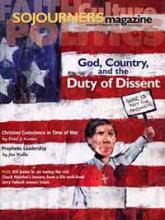Do you suffer from post-millennial jitters? Sex, death, taxes, or impending overthrow of the status quo got you down?
Peeking over the edge of a new year, the world looks as scary as ever. Nuclear fissile material (that could kill thousands and give the rest of us a slow cancerous death) is now available at your local Terrorist Depot. Lunatics, trained by our own tax dollars, take out the citizenry with a Bushmaster assault rifle, while Smith & Wesson decides that marketing to kids isn't such a bad idea after all. Let's not even talk about the stock market, pedophilia, or the decline of the median household income.
It has ever been thus. Violence, sex, money, and fear of change are part of the human condition. Playwright Euripides covered the territory in "Medea" in 431 B.C.E. A woman tries to secure her hold on political power through deceit, sex, and murder (even of her children). "Civilization," says actress Fiona Shaw, who's currently playing Medea, "is a very thin veil of words."
About the same time the play was written, Hebrew scholars were publishing the book of Esther in Persia (then at war with Greece). A woman with relative safety under the king's political protection chooses to fast, pray, and risk death in order to challenge the king's worldly power. Esther's uncle Mordecai reminds her that perhaps she has been given this palatial life just so she could act in faith and save the Jewish peopleperhaps she was chosen "for just such a time as this."
We always have a choice in how we live. Our "times" don't change that much over history. What plagued people in the time of Medea and Esther plagues us still. As Christians, then, how do we choose to live in times such as these?
Read the Full Article
